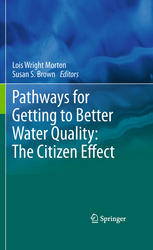

Most ebook files are in PDF format, so you can easily read them using various software such as Foxit Reader or directly on the Google Chrome browser.
Some ebook files are released by publishers in other formats such as .awz, .mobi, .epub, .fb2, etc. You may need to install specific software to read these formats on mobile/PC, such as Calibre.
Please read the tutorial at this link: https://ebookbell.com/faq
We offer FREE conversion to the popular formats you request; however, this may take some time. Therefore, right after payment, please email us, and we will try to provide the service as quickly as possible.
For some exceptional file formats or broken links (if any), please refrain from opening any disputes. Instead, email us first, and we will try to assist within a maximum of 6 hours.
EbookBell Team

5.0
98 reviewsThe citizen effect refers to the many ways people engage science, technology and each other to identify and solve local watershed and water resource problems. The waters of the United States are sources of pride and prosperity, and they are intimately connected to the land. Citizens have both rights to use and responsibility for conserving, protecting and sustaining these public water resources. However, streams, rivers and lakes across the country are becoming degraded and in danger of losing their capacity to meet the needs of the human, plant and animal populations which depend on them. While many point sources of pollutants can be and have been addressed by regulation, nonpoint source pollution resulting from independent land use decisions across a broad landscape, especially in agriculture, remains a very difficult issue. The U.S. Environmental Protection Agency (EPA) in their National Water Quality Inventory Report to Congress singles out nonpoint source pollution as one of the biggest environmental challenges of the 21st century. There is increasing evidence that persistent nonpoint source water problems can be effectively addressed when public deliberation is linked to scientific knowledge and technical expertise. The subject of this book is human social interactions. We present qualitative and quantitative studies of citizens’ individual and collective efforts to work through the complex issues associated with watershed management. These results are intended to provide insight and practical knowledge that can be used by those who are working to bring change and long-lasting protection and improvement to U.S. waters.